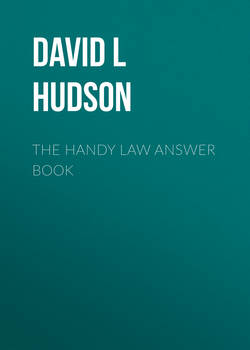Читать книгу The Handy Law Answer Book - David L Hudson - Страница 30
На сайте Литреса книга снята с продажи.
What happened in the large state of Virginia with respect to ratification?
ОглавлениеActually, New Hampshire became the required ninth state on June 21, 1788, voting 57 to 46 in favor of the Constitution. Although the Constitution was technically in effect after New Hampshire ratified it, Virginia was such a large and powerful state that it was crucial for it to ratify the Constitution. The large state of Virginia did not know that New Hampshire had become the necessary ninth state, so the debate continued there.
Virginia was the home of James Madison, George Washington, and Thomas Jefferson, all of whom supported the Constitution. However, the state was also the home of a group of well-known Anti-Federalists, including Patrick Henry and George Mason. The battle in Virginia was particularly difficult. After one debate, Madison fell ill and was bed-ridden for three straight days. Some great statesmen, such as the brilliant orator from Virginia, Patrick Henry, led the Anti-Federalists. During the debate on the ratification in his state, Henry asked: “What right had they [the Constitution delegates] to say, ‘We the People?’”
In arguing against the Constitution, George Mason wrote, “It is ascertained, by history, that there never was a government over a very extensive country without destroying the liberties of the people.” However, state delegate Edmund Pendleton countered in the Virginia Ratification Convention: “In reviewing the history of the world, shall we find an instance where any society retained its liberty without government.”
In June, Governor Edmund Randolph stood up and spoke in favor of the Constitution even though he had failed to sign it last September. Randolph explained that he did not sign because the document did not contain necessary amendments. However, he said that because other states had proposed amendments to be passed after ratification, he would vote in favor of ratification. He also pointed out that eight other states had already ratified.
Patrick Henry charged that Randolph had been persuaded to change positions by none other than George Washington. Though this charge cannot be proven beyond a shadow of a doubt, Washington did later name Randolph his first attorney general.
Madison managed to gather enough support for the Constitution in the Virginia state convention on June 25, 1788. The delegates narrowly approved the Constitution. Two days later, a committee at the convention proposed a bill of rights to be added to the Constitution. Virginia voted in favor of ratification by a narrow vote of 89 to 79. Virginia also attached proposed amendments as well, many of which would later be contained in the Bill of Rights. Some Anti-Federalists were very upset and wanted to resist the new Constitution. However, at a meeting in Richmond, Patrick Henry said that they must accept defeat. “As true and faithful republicans [honorable citizens] you had all better go home.”
One of the most prominent figures of the American Revolution and the country’s early history, Patrick Henry was an Anti-Federalist who opposed a U.S. Constitution that he feared would give government too much power over individuals (Library of Congress).
Many Anti-Federalists became supporters of the new government. For example, Anti-Federalist Elbridge Gerry, who refused to sign the Constitution, later became James Madison’s vice president.
